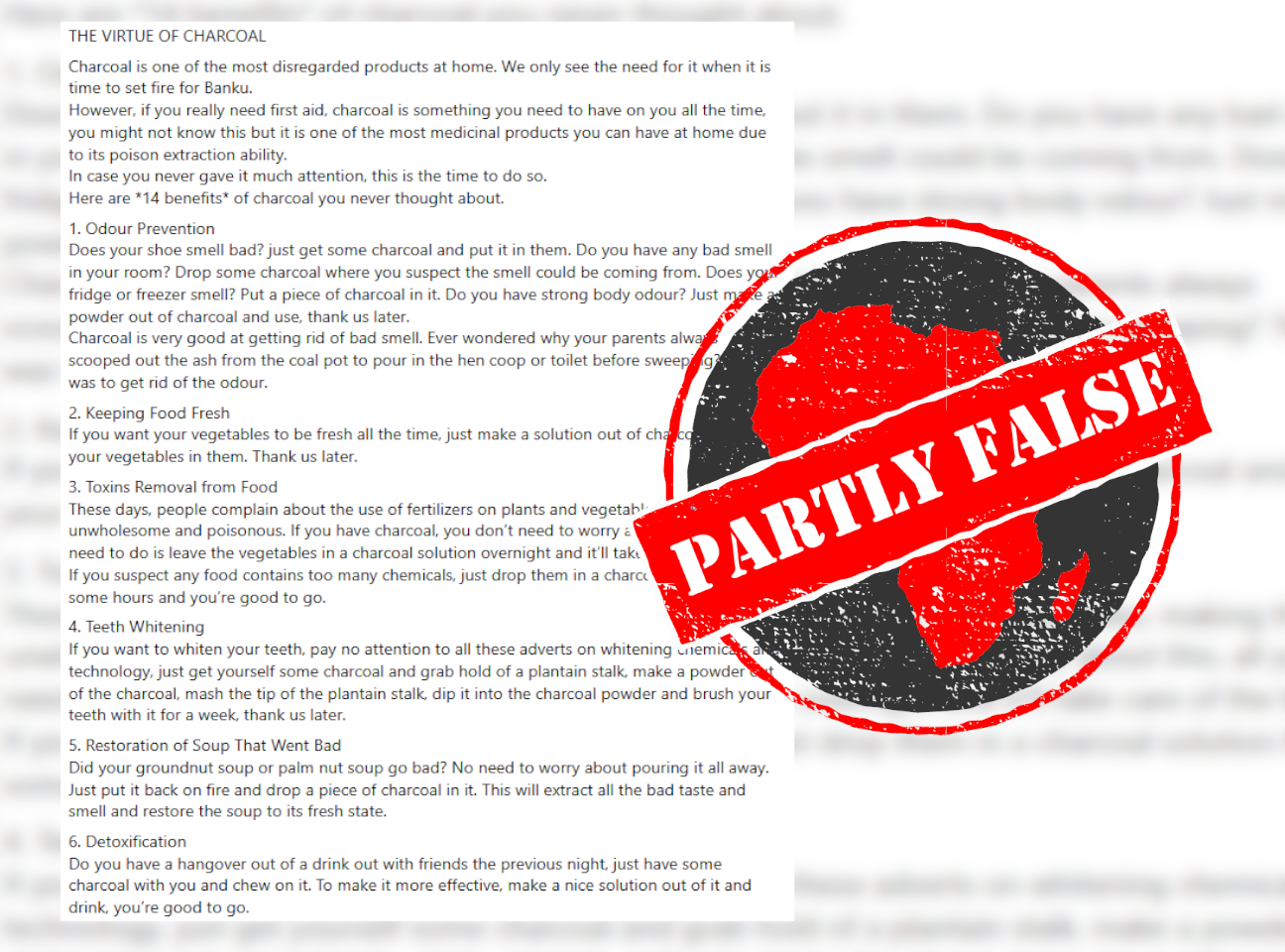IN SHORT: Pour charcoal on a wound to extract poison? Use charcoal to treat ulcers? These are some of the more surprising claims made about charcoal's medicinal properties, but treat them with caution, say experts.
A Facebook post shared more than 61,000 times, with 19,000 likes and 12,000 comments, has been doing the rounds on Facebook since August 2017. It lists 14 “benefits” of charcoal.
“If you really need first aid, charcoal is something you need to have on you all the time,” it says. “You might not know this but it is one of the most medicinal products you can have at home due to its poison extraction ability.”
The post goes on to list several uses for charcoal. You can simply use any charcoal you find in your home, the post says: “Activated charcoal is also useful but the above benefits are from using simple charcoal.”
Charcoal is the residue left when a material containing carbon is partially burned. It is a “highly absorbent material that holds chemical molecules, gas, and ions”, David Epstein, a gastroenterologist and senior lecturer in the department of medicine at the University of Cape Town, told Africa Check.
Activated charcoal is modified by heat, which removes these bound chemicals and molecules, thereby increasing its surface area. This makes it more absorbent, Epstein said.
“Medically produced activated charcoal is preferable if any charcoal is to be used,” he said.

Charcoal ‘very unpalatable, obsolete and impracticable’ treatment for high cholesterol
As we found in our in-depth fact-check of this post, some of the claims have some truth to them. But others can’t be scientifically proven, including that smearing a thick solution of charcoal on your body and leaving it on for hours can help with acne and other skin problems.
The Facebook post also claims that taking charcoal with water or chewing pieces of it can “eliminate bad cholesterol” and treat stomach ulcers.
But what do the experts say?
Cholesterol as a fat-like substance found in your blood and made by your liver. It is essential for good health because it helps your body to perform important tasks such as digesting fatty foods.
But having high levels of “bad” cholesterol, called low-density lipoprotein cholesterol, can cause plaque to build up in the arteries. This puts people at risk of heart attack and stroke.
Epstein told Africa Check that cholesterol circulated from the liver to the gut and then back to the liver and “there is some scientific evidence to show” that taking charcoal could prevent recirculation of cholesterol and thus reduce the cholesterol level.
“But using charcoal would be a very unpalatable, obsolete and impracticable way of treating high cholesterol,” Epstein said. He said people with high cholesterol levels should rather talk to their doctor about treatment and lifestyle changes, which range from exercise and a healthy diet to medication.
Infected wounds must be treated, not with charcoal
Other claims in the posts are more dangerous.
Africa Check recently debunked the popular claim that charcoal can counteract date rape drugs – it can’t. Despite this, the claim has been repeated on public Facebook groups with thousands of followers.
The Facebook post also has dangerous advice for when a wound has become infected, to the point of requiring amputation. It reads: “Don’t stress over it, get a large amount of charcoal powder and pour it on the wound.”
It claims the charcoal will extract “all the poison from the wound”.
“I have never encountered a situation where activated charcoal is applied directly to a wound,” John Tilley, a specialist physician at the Wits Donald Gordon Medical Centre in Johannesburg, told Africa Check.
“Placing activated charcoal directly on a wound is not a good idea,” Tilley said. “It’s likely very difficult to get it off.”
Relying on charcoal alone to heal a wound could be dangerous. If left untreated, severely infected wounds can lead to sepsis, a life-threatening medical emergency.
The Facebook post also claims that if you have a hangover, you can take a charcoal solution or chew on charcoal to help “detoxify” the body and “neutralise” the alcohol. But this is misleading.
But as we previously reported, using activated charcoal to neutralise poison should only be done in emergency situations. And some studies have found that activated charcoal may not be enough to counteract the effects of pure alcohol poisoning.
Treatment for alcohol poisoning ranges from giving intravenous fluids to treat dehydration to pumping out the stomach contents with a tube.
Water and charcoal …
What effect would charcoal have on contaminated water?
We asked Colin Basch, the managing director of Process Water Technologies, a South African water purification company, about this part of the claim.
Basch said that while regular charcoal could be used in water filtration, it was not as effective as activated carbon, another term for activated charcoal.
Although both regular and activated charcoal could remove some water contaminants, Basch said, “they do not remove all contaminants and are therefore used in conjunction with other treatment processes”.
“Activated carbon is not effective against microbial contamination such as coliform bacteria and viruses, and heavy metals,” Basch said.
Coliform bacteria are rod-shaped microorganisms found in the intestinal tracts of animals and people. When found in water, they can indicate that the water has been contaminated with disease-causing organisms or faeces.
Basch said that additional treatment processes and disinfection were therefore required to effectively treat contaminated water and make it suitable for human consumption. “Regular charcoal is best left for art, odour removal and cooking.”
And ulcer treatment?
But what about treating ulcers?
Stomach ulcers are open sores that develop either on the lining of the stomach or in a part of the intestine called the duodenum.
The most common causes of stomach ulcers are long-term use of high doses of anti-inflammatory medicines or an infection with H pylori bacteria, or Helicobacter pylori.
“I would not recommend using charcoal as a treatment for ulcers,” Dr Peter Barrow, a consultant gastroenterologist at the Wits Donald Gordon Medical Centre, told us.
“I think what they are indirectly referring to is that activated charcoal may have some antibacterial effects and as such may slow replication of H pylori,” he said.
But Barrow said it was wrong to say activated charcoal could treat ulcers. “It may actually reduce absorption of the drugs we normally use to treat ulcers,” he said.
A number of claims made in Facebook posts about charcoal should be treated with extreme caution.
Republish our content for free
For publishers: what to do if your post is rated false
A fact-checker has rated your Facebook or Instagram post as “false”, “altered”, “partly false” or “missing context”. This could have serious consequences. What do you do?
Click on our guide for the steps you should follow.
Publishers guideAfrica Check teams up with Facebook
Africa Check is a partner in Meta's third-party fact-checking programme to help stop the spread of false information on social media.
The content we rate as “false” will be downgraded on Facebook and Instagram. This means fewer people will see it.
You can also help identify false information on Facebook. This guide explains how.



Add new comment